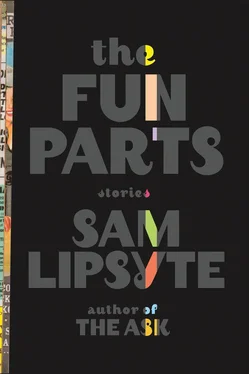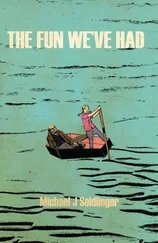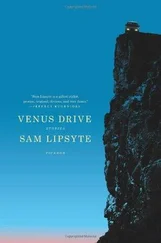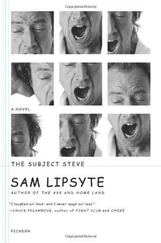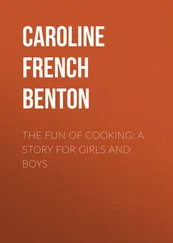Like what some stuck-up clown would ride.
* * *
Tovah’s Subaru had a dead battery. The garage guy offered to jump the car. He popped the hood, and they all leaned in for a better look at the massive corrosion, the split hoses, what the garage guy called a cracked block. Not that Tovah could have known. She never used her car, had loaned it out often over the years.
“I’m still going with you,” she said.
They didn’t speak much during the bus ride. Tovah scribbled in her notebook, and Mandy studied the Hudson River and hated Tovah. They got off at the town plaza and bought some calzone.
When they reached the home, they found Mandy’s father sitting up in his patio chair. Mandy had expected a weirdly folded arm, a contorted jaw, maybe some slobber, but he looked fine. He waved off the food but gestured for Tovah to join him. The attendant Mandy had tipped pulled her into a tiny dispensary to talk.
“So,” Mandy said. “He seems pretty okay. Pretty … mild.”
“The doctor was here this morning. We’re thinking now it wasn’t a stroke at all.”
“That’s great.”
“Yeah, well.”
“Well, what?”
“The doctor noticed some other things. Symptomatic things with the eyes and such. Your father described recent headaches.”
“Headaches?”
“The doctor wants to run some tests.”
“Tests for what?”
The attendant pointed to her temple, shrugged.
“What does that mean?” Mandy asked.
“Nobody knows anything. That’s why we have tests.”
Maybe if Mandy had tipped the attendant more, she would have divulged the ailment that would soon slaughter her father.
The attendant stepped out of the dispensary. Mandy paused before she followed. Craig would have known how to bang those white cabinets open, grab the goodies.
Tovah and Mandy’s father hunched together at the table. Mandy joined them, started to think of something nostalgic and uplifting to say, when she realized she couldn’t understand them at all. They spoke in what sounded like German about something very serious, but also occasionally funny, and frightening and unendurable, judging by Tovah’s face, which every so often froze like the faces of women in silent movies.
“You guys are getting on like gangbusters,” Mandy interrupted. “Tovah, I had no idea you spoke German.”
“It’s Yiddish. My grandmother taught me.”
“What are you guys talking about?”
“The whatchamacallit,” Jacob said.
He stared up at his daughter with that foul gleam. She’d never had a chance, really, could never be the daughter, the destiny you claw through the blood and feces of enslavement, of death, to claim. She consoled herself with something she’d read back in the days she still read about the whatchamacallit by the man who threw himself down the stairs: the good people died. Mostly only assholes made it out. That was how she remembered the passage anyway. That was her read.
“You must know all these stories,” Tovah said.
“Yes, I’m a child of a survivor. A survivor of a survivor.”
Mandy smiled, stood. “I need to check on some things. Are you two okay here for a while?”
“Oh, yes,” said Tovah. “Your father is amazing. I had no idea.”
“Daddy?”
“How’s your mother doing?” he said.
“She’s dead, Dad. Feel free to share your pain about it.”
Jacob’s cheeks drew in.
“You can’t share pain,” he said, put his hand on Tovah’s wrist. “This girl knows that. She’s a poet.”
* * *
It took hours to cross the towns — Nearmont, Eastern Valley, Rodney Heights — that led to Mandy’s old house. All that cardio ballet, and it still wiped her out, though she got her second wind and a floaty feeling in the bargain. Her friends, the endorphins. She wanted to leap off a boat and swim with them.
Now she stood at the end of the driveway on Duffy Lane, a lost pilgrim in front of the pea-green split-level with beige trim. She ached for a certain sensation, a sudden click in the soul’s alignment. Closure, some called it in the meetings. The more churchy addicts referred to forgiveness, but she’d always known what people meant. She’d hungered for it.
Maybe if she just knocked on the door, the family inside would bid her welcome. She’d knock, and when a beautiful Sri Lankan boy answered, she’d lean down and whisper her story.
“Is it closure you seek?” he’d say in melodious English.
Inside, the father of the family would smile and take the mother’s hand.
“You have made us happy by coming,” he would say. “We have waited many years for this.”
“Closure is not forgiveness,” the mother would say, with even more melodiousness than the child. “But you are a blessed one, for you shall enjoy both.”
Then there would be an unexpected crunching sound, but actually that noise wasn’t coming from Mandy’s movie. An SUV rolled into the gravel driveway. The doors opened and children scurried out in scout uniforms. A tired-looking woman with grocery sacks followed.
“Can I help you?” she said.
Mandy thought she might be Brazilian. Or maybe Belgian.
“Look,” the woman said, and stabbed a finger down the road. “If it’s about the nightclub, I already signed the petition. I don’t want them to build it any more than you do. Those drunks will crash into my living room. But I’m really busy right now. Take care.”
Mandy nodded, and the woman turned to her stoop.
Her legs throbbed, had gone rubbery, and the bus back to the city was in the other direction, but Mandy hiked on around a bend of firs. The Shell sign hovered, its colors dulled, a corner of it broken, or maybe bitten off. They’d shuttered the station, covered the pumps with dirty canvas hoods.
What the poor woman died for, thought Mandy, but then knew it was a rotten thought, too romantic, something for Tovah’s poem cycle. The blazer, the tan, the lost dream of American entrepreneurship, her seduction and abandonment by transnational loins — these things hadn’t killed her mother. Nor had her father, with his smeary, world-historical wound. What murdered her was her mind, a madness factory full of blast furnaces and smokestacks. Mandy’s mind had erected one, too, but Mandy would discover a way to raze it. She would grow a beautiful garden on the ashes of the factory, teach cardio ballet in more and more places, build a modest cardio ballet empire. She would forgive Craig and help him however she could. She would help everybody. She would save herself.
The bus pulled into Port Authority, and she rode the subway uptown. Cal waited near the door of her building, and again they didn’t speak but did their dance of nods and shrugs, and he followed her into the lobby, just as he must have followed her home some night to know where she lived. What was creepy to civilians was protocol for their kind. How else were you going to figure out where somebody lived, where the drugs were, or the money, or somebody to cling to long enough to forget the shame.
Inside the apartment, Cal pulled a bottle of wine from his coat, but Mandy shook her head, poured them glasses of water from the tap. They gulped them down and filled the glasses again. Then Mandy led Cal into the bedroom and lit a lavender candle. Cal stood before her and stroked her hair.
He started to take off his shirt, but Mandy whispered, “No.” He seemed to understand, even tugged his sleeves down to his wrists to better hide his tattoos. He pulled her to the bed, and his body was smooth and taut through his shirt. Toward the end, he whispered something too muffled to make out, though she heard the words “beautiful” and “feels” and “so good,” and then maybe “cabal.”
The world was what it was, one day at a time. Mandy rocked Cal to sleep and thought about this day she’d had, this stranger in her bed. She thought about pinot blanc. She thought about all the colors of the key tags, about salmon and salmon-colored blazers and the cleaver on the kitchen’s magnetic strip. Before she fell asleep, she yawned once and stretched her arm across the panzer tank, invisible to her now, that in the morning would burst forth in loud hues from Cal’s belly.
Читать дальше
